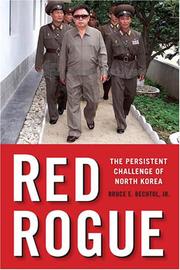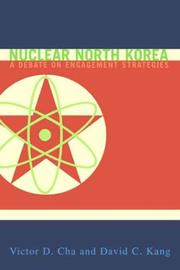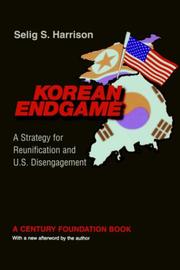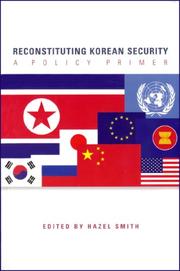| Listing 1 - 7 of 7 |
Sort by
|
Book
ISBN: 9781626164529 9781626164536 9781626164543 1626164541 1626164533 1626164525 Year: 2017 Publisher: Washington (DC): Georgetown university press,
Abstract | Keywords | Export | Availability | Bookmark
 Loading...
Loading...Choose an application
- Reference Manager
- EndNote
- RefWorks (Direct export to RefWorks)
North Korea is perilously close to developing strategic nuclear weapons capable of hitting the United States and its allies in East Asia. Since their first nuclear test in 2006, North Korea has struggled to perfect delivery systems, but Kim Jong-un's regime now appears to be close. Sung Chull Kim, Michael Cohen, and the contributors to this volume contend that the time to prevent North Korea from getting this capability is virtually over, and instead scholars and policymakers must turn their attention to how to deter North Korea. The United States, South Korea, and Japan must also come to terms with the fact their North Korea will be able to deter them with its nuclear arsenal. How will the erratic Kim Jong-un behave when North Korea does develop the capability to hit medium- and long-range targets with nuclear weapons; how will the United States, South Korea, and China respond; and what will this mean for regional stability in the short term and long term? The international group of authors in this volume address these questions and offer a timely analysis of the consequences of an operational North Korean nuclear capability for international security.
NUCLEAR WEAPONS--GOVERNMENT POLICY--KOREA (NORTH) --- NUCLEAR NONPROLIFERATION--KOREA (NORTH) --- USA--FOREIGN RELATIONS--KOREA (NORTH) --- KOREA (NORTH)--FOREIGN RELATIONS--USA --- Nuclear weapons --- Nuclear arms control --- United States --- Korea (North) --- Foreign relations --- Korea [North ] --- Nuclear weapons - Korea (North) --- Nuclear arms control - Korea (North) --- United States - Foreign relations - Korea (North) --- Korea (North) - Foreign relations - United States.

ISBN: 1612343635 9781612343631 9781597971119 1597971111 Year: 2008 Publisher: Washington (D.C.): Potomac Books,
Abstract | Keywords | Export | Availability | Bookmark
 Loading...
Loading...Choose an application
- Reference Manager
- EndNote
- RefWorks (Direct export to RefWorks)
A unique analysis of the evolving North Korean threat and the challenges facing the South Korea-U.S. alliance
Nuclear arms control --- Nuclear weapons control --- Arms control --- Nuclear weapons --- Korea (North) --- Korea (South) --- United States --- Korean People's Republic --- People's Democratic Republic of Korea --- Koreĭskai︠a︡ Narodno-Demokraticheskai︠a︡ Respublika --- Korea (North Korean Government) --- Democratic People's Republic of Korea --- North Korea --- KNDR --- Chʻao-hsien min chu chu i jen min kung ho kuo --- Koreai Népi Demokratikus Köztársaság --- Korea (Democratic People's Republic) --- K.N.D.R. --- K.R.L.D. --- Korea (People's Democratic Republic) --- Korean People's Democratic Republic --- Chōsen Minshu Shugi Jinmin Kyōwakoku --- Chosŏn Minjujuŭi Inmin Konghwaguk --- KRLD --- Koreańska Republika Ludowo-Demokratyczna --- Kūriyā al-Dīmuqrāṭīyah --- D.P.R.K. --- DPRK --- Corée du Nord --- República Popular Democrática de Corea --- Corea (North) --- North Korean Interim Government --- Chosun Minchu-chui Inmin Konghwa-guk --- Chaoxian minzhu zhuyi renmin gongheguo --- 朝鲜民主主义人民共和国 --- Foreign relations. --- Economic policy. --- Military policy. --- Foreign relations --- Economic policy --- Military policy --- Nuclear arms control - Korea (North) --- Korea (North) - Foreign relations --- Korea (North) - Economic policy --- Korea (North) - Military policy --- Korea (North) - Foreign relations - Korea (South) --- Korea (South) - Foreign relations - Korea (North) --- Korea (North) - Foreign relations - United States --- United States - Foreign relations - Korea (North)

ISBN: 1282871919 9786612871917 0231505337 9780231505338 9780231131285 0231131283 9781282871915 6612871911 Year: 2003 Publisher: New York Columbia University Press
Abstract | Keywords | Export | Availability | Bookmark
 Loading...
Loading...Choose an application
- Reference Manager
- EndNote
- RefWorks (Direct export to RefWorks)
Coming to the issues from different perspectives, the authors together have written an essential work of clear-eyed reflection and authoritative analysis. They refute a number of misconceptions and challenge faulty thinking that surrounds the discussion of North Korea, most important, the idea that North Korea is an irrational nation. Cha and Kang contend that however provocative, even deplorable, the North's behavior may at times be, it is not incomprehensible or incoherent.
Korea (North) -- Foreign relations -- United States. --- Korea (North) -- Military policy. --- Nuclear warfare -- Korea (North). --- United States -- Foreign relations -- Korea (North). --- World politics -- 21st century. --- Military & Naval Science --- Law, Politics & Government --- Armies --- Nuclear warfare --- World politics --- Korea (North) --- United States --- Military policy. --- Foreign relations --- Atomic warfare --- CBR warfare --- Nuclear strategy --- Nuclear war --- Thermonuclear warfare --- War --- Nuclear crisis control --- Nuclear weapons --- K9564.11 --- K9570.90 --- K9578.15 --- Korea: International politics, law and relations of North Korea -- North America -- United States --- Korea: Defense and military -- general and history -- North Korea (1945- ) --- Korea: Defense and military -- weaponry -- North Korea

ISBN: 0691116261 069109604X 1400814332 9786612157080 1282157086 1400824915 9781400824915 9781400814336 9780691116266 9780691096049 Year: 2002 Publisher: Princeton, N.J. ; Oxford : Princeton University Press,
Abstract | Keywords | Export | Availability | Bookmark
 Loading...
Loading...Choose an application
- Reference Manager
- EndNote
- RefWorks (Direct export to RefWorks)
Nearly half a century after the fighting stopped, the 1953 Armistice has yet to be replaced with a peace treaty formally ending the Korean War. While Russia and China withdrew the last of their forces in 1958, the United States maintains 37,000 troops in South Korea and is pledged to defend it with nuclear weapons. In Korean Endgame, Selig Harrison mounts the first authoritative challenge to this long-standing U.S. policy. Harrison shows why North Korea is not--as many policymakers expect--about to collapse. And he explains why existing U.S. policies hamper North-South reconciliation and reunification. Assessing North Korean capabilities and the motivations that have led to its forward deployments, he spells out the arms control concessions by North Korea, South Korea, and the United States necessary to ease the dangers of confrontation, centering on reciprocal U.S. force redeployments and U.S. withdrawals in return for North Korean pullbacks from the thirty-eighth parallel. Similarly, he proposes specific trade-offs to forestall the North's development of nuclear weapons and missile delivery systems, calling for the withdrawal of the U.S. nuclear umbrella in conjunction with agreements to denuclearize Korea embracing China, Russia, and Japan. The long-term goal of U.S. policy, he argues, should be the full disengagement of U.S. combat forces from Korea as part of regional agreements insulating the peninsula from all foreign conventional and nuclear forces. A veteran journalist with decades of extensive firsthand knowledge of North Korea and long-standing contacts with leaders in Washington, Seoul, and Pyongyang, Harrison is perfectly placed to make these arguments. Throughout, he supports his analysis with revealing accounts of conversations with North Korean, South Korean, and U.S. leaders over thirty-five years. Combining probing scholarship with a seasoned reporter's on-the-ground experience and insights, he has given us the definitive book on U.S. policy in Korea--past, present, and future.
USA--FOREIGN RELATIONS--KOREA (NORTH) --- KOREA (NORTH)--FOREIGN RELATIONS--USA --- USA--FOREIGN RELATIONS--KOREA (SOUTH) --- KOREA (SOUTH)--FOREIGN RELATIONS--USA --- KOREAN REUNIFICATION QUESTION (1945- ) --- USA--MILITARY RELATIONS--KOREA (NORTH) --- USA--MILITARY RELATIONS--KOREA (SOUTH) --- KOREA (NORTH)--MILITARY RELATIONS--USA --- Korean reunification question (1945- ) --- Korean unification question (1945- ) --- Reunification of Korea (1945- ) --- Unification of Korea (1945- ) --- Korea (North) --- Korea (South) --- United States --- Foreign relations --- Military relations --- K9549 --- K9554.11 --- K9540.80 --- Korea: International politics, law and relations -- North-South relation --- Korea: International politics, law and relations -- North America -- United States --- Korea: International politics, law and relations -- history -- modern period, postwar period (1945- ) --- East Asia --- Strategic aspects.
Book
ISBN: 9780813167466 9780813167626 0813167620 0813167469 0813167752 0813167639 9780813167756 Year: 2016 Publisher: Lexington, Kentucky
Abstract | Keywords | Export | Availability | Bookmark
 Loading...
Loading...Choose an application
- Reference Manager
- EndNote
- RefWorks (Direct export to RefWorks)
Given that a new president will soon occupy the White House, Walter C. Clemens Jr. argues that now is the time to reconsider US diplomatic efforts in North Korea. In 'North Korea and the World', Clemens poses the question, 'Can, should, and must we negotiate with a regime we regard as evil?'. Weighing the needs of all the stakeholders he concludes that the answer is yes.
KOREA (NORTH)--FOREIGN RELATIONS --- HUMAN RIGHTS--KOREA (NORTH) --- NUCLEAR WEAPONS--GOVERNMENT POLICY--KOREA (NORTH) --- KOREA (NORTH)--FOREIGN RELATIONS--USA --- USA--FOREIGN RELATIONS--KOREA (NORTH) --- Nuclear nonproliferation --- Nuclear weapons --- Human rights --- Export of nuclear materials --- Export of nuclear technology --- International control of nuclear energy --- Nonproliferation, Nuclear --- Nuclear energy --- Nuclear exports --- Nuclear proliferation --- Proliferation, Nuclear --- Nuclear arms control --- Nuclear-weapon-free zones --- Basic rights --- Civil rights (International law) --- Rights, Human --- Rights of man --- Human security --- Transitional justice --- Truth commissions --- International cooperation. --- International control --- Law and legislation --- United States --- Korea (North) --- Korean People's Republic --- People's Democratic Republic of Korea --- Koreĭskai︠a︡ Narodno-Demokraticheskai︠a︡ Respublika --- Korea (North Korean Government) --- Democratic People's Republic of Korea --- North Korea --- KNDR --- Chʻao-hsien min chu chu i jen min kung ho kuo --- Koreai Népi Demokratikus Köztársaság --- Korea (Democratic People's Republic) --- K.N.D.R. --- K.R.L.D. --- Korea (People's Democratic Republic) --- Korean People's Democratic Republic --- Chōsen Minshu Shugi Jinmin Kyōwakoku --- Chosŏn Minjujuŭi Inmin Konghwaguk --- KRLD --- Koreańska Republika Ludowo-Demokratyczna --- Kūriyā al-Dīmuqrāṭīyah --- D.P.R.K. --- DPRK --- Corée du Nord --- República Popular Democrática de Corea --- Corea (North) --- North Korean Interim Government --- Chosun Minchu-chui Inmin Konghwa-guk --- Chaoxian minzhu zhuyi renmin gongheguo --- 朝鲜民主主义人民共和国 --- Foreign relations
Book
ISBN: 0833081756 0833081721 9780833081759 9780833081735 083308173X 9780833081742 0833081748 9780833081728 Year: 2013 Publisher: Santa Monica, CA : RAND Corporation,
Abstract | Keywords | Export | Availability | Bookmark
 Loading...
Loading...Choose an application
- Reference Manager
- EndNote
- RefWorks (Direct export to RefWorks)
A North Korean government collapse would have serious consequences, including a humanitarian disaster and civil war. The Republic of Korea and the United States can help mitigate the consequences, seeking unification by being prepared to deliver humanitarian aid in the North, stop conflict, demilitarize the North Korean military over time, secure and eliminate North Korean weapons of mass destruction, and manage Chinese intervention.
Failed states -- Korea (North). --- Korea (North) -- Economic conditions -- 21st century. --- Korea (North) -- Foreign relations -- United States. --- Korea (North) -- Politics and government -- 2011. --- Korean reunification question (1945- ). --- United States -- Foreign relations -- Korea (North). --- Failed states --- Korean reunification question (1945- ) --- Korea (North) --- United States --- Economic conditions --- Foreign relations --- Politics and government --- Korean unification question (1945- ) --- Reunification of Korea (1945- ) --- Unification of Korea (1945- ) --- State failure --- Korean People's Republic --- People's Democratic Republic of Korea --- Koreĭskai︠a︡ Narodno-Demokraticheskai︠a︡ Respublika --- Korea (North Korean Government) --- Democratic People's Republic of Korea --- North Korea --- KNDR --- Chʻao-hsien min chu chu i jen min kung ho kuo --- Koreai Népi Demokratikus Köztársaság --- Korea (Democratic People's Republic) --- K.N.D.R. --- K.R.L.D. --- Korea (People's Democratic Republic) --- Korean People's Democratic Republic --- Chōsen Minshu Shugi Jinmin Kyōwakoku --- Chosŏn Minjujuŭi Inmin Konghwaguk --- KRLD --- Koreańska Republika Ludowo-Demokratyczna --- Kūriyā al-Dīmuqrāṭīyah --- D.P.R.K. --- DPRK --- Corée du Nord --- República Popular Democrática de Corea --- Corea (North) --- North Korean Interim Government --- Chosun Minchu-chui Inmin Konghwa-guk --- Political science --- Chaoxian minzhu zhuyi renmin gongheguo --- 朝鲜民主主义人民共和国

ISBN: 9280871137 9789280871135 1281253065 9781281253064 9789280811445 9280811444 Year: 2007 Publisher: Tokyo: United Nations university press,
Abstract | Keywords | Export | Availability | Bookmark
 Loading...
Loading...Choose an application
- Reference Manager
- EndNote
- RefWorks (Direct export to RefWorks)
Nuclear nonproliferation --- Nuclear weapons --- National security --- Atomic weapons --- Fusion weapons --- Thermonuclear weapons --- Weapons of mass destruction --- No first use (Nuclear strategy) --- Nuclear arms control --- Nuclear disarmament --- Nuclear warfare --- Social aspects --- K9549 --- K9560 --- K9578.15 --- Korea: International politics, law and relations -- North-South relation --- Korea: International politics, law and relations of North Korea -- general, world and transregional --- Korea: Defense and military -- weaponry -- North Korea --- Korea (North) --- Korean People's Republic --- People's Democratic Republic of Korea --- Koreĭskai︠a︡ Narodno-Demokraticheskai︠a︡ Respublika --- Korea (North Korean Government) --- Democratic People's Republic of Korea --- North Korea --- KNDR --- Chʻao-hsien min chu chu i jen min kung ho kuo --- Koreai Népi Demokratikus Köztársaság --- Korea (Democratic People's Republic) --- K.N.D.R. --- K.R.L.D. --- Korea (People's Democratic Republic) --- Korean People's Democratic Republic --- Chōsen Minshu Shugi Jinmin Kyōwakoku --- Chosŏn Minjujuŭi Inmin Konghwaguk --- KRLD --- Koreańska Republika Ludowo-Demokratyczna --- Kūriyā al-Dīmuqrāṭīyah --- D.P.R.K. --- DPRK --- Corée du Nord --- República Popular Democrática de Corea --- Corea (North) --- North Korean Interim Government --- Chosun Minchu-chui Inmin Konghwa-guk --- Chaoxian minzhu zhuyi renmin gongheguo --- 朝鲜民主主义人民共和国 --- Foreign relations. --- Nuclear nonproliferation - Korea (North) --- Nuclear weapons - Social aspects - Korea (North) --- National security - Korea (North) --- Korea (North) - Foreign relations.
| Listing 1 - 7 of 7 |
Sort by
|

 Search
Search Feedback
Feedback About UniCat
About UniCat  Help
Help News
News